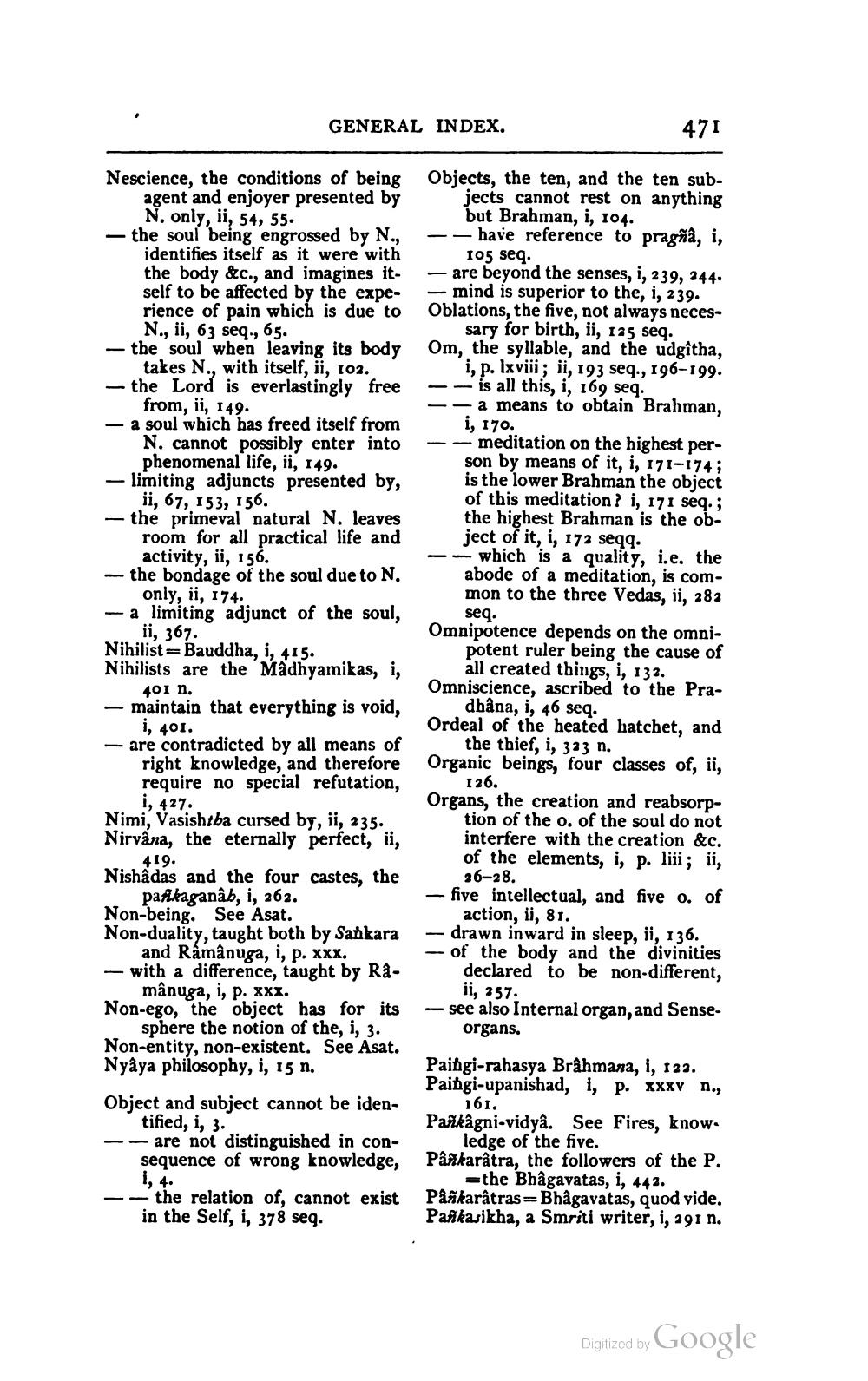________________
GENERAL INDEX.
471
Nescience, the conditions of being
agent and enjoyer presented by
N. only, ii, 54, 55. the soul being engrossed by N.,
identifies itself as it were with the body &c., and imagines it- self to be affected by the expe- rience of pain which is due to
N., ii, 63 seq., 65. - the soul when leaving its body
takes N., with itself, ii, 102. - the Lord is everlastingly free
from, ii, 149. - a soul which has freed itself from
N. cannot possibly enter into
phenomenal life, ii, 149. - limiting adjuncts presented by,
ii, 67, 153, 156. - the primeval natural N. leaves
room for all practical life and
activity, ii, 156. - the bondage of the soul due to N.
only, ii, 174. - a limiting adjunct of the soul,
ii, 367. Nihilist = Bauddha, i, 415. Nihilists are the Madhyamikas, i,
401 n. - maintain that everything is void,
i, 401. - are contradicted by all means of
right knowledge, and therefore require no special refutation,
i, 427. Nimi, Vasishtba cursed by, ii, 235. Nirvana, the eternally perfect, ii,
419. Nishảdas and the four castes, the
pafkaganâb, i, 262. Non-being. See Asat. Non-duality, taught both by Sankara
and Râmânuga, i, p. xxx. - with a difference, taught by Ra
mânuga, i, P. XXX. Non-ego, the object has for its
sphere the notion of the, i, 3. Non-entity, non-existent. See Asat. Nyâya philosophy, i, 15 n.
objects, the ten, and the ten sub
jects cannot rest on anything
but Brahman, i, 104. -- have reference to pragña, i,
105 seq. — are beyond the senses, i, 239, 244. - mind is superior to the, i, 239. Oblations, the five, not always neces
sary for birth, ii, 125 seq. Om, the syllable, and the udgîtha,
i, p. lxviii; ii, 193 seq., 196-199. -- is all this, i, 169 seq.
- a means to obtain Brahman,
i, 170. - meditation on the highest person by means of it, i, 171-174; is the lower Brahman the object of this meditation? i, 171 seq.; the highest Brahman is the ob
ject of it, i, 172 seqq. -- which is a quality, i.e. the
abode of a meditation, is common to the three Vedas, ii, 282
seq. Omnipotence depends on the omni
potent ruler being the cause of
all created things, i, 132. Omniscience, ascribed to the Pra
dbâna, i, 46 seq. Ordeal of the heated hatchet, and
the thief, i, 323 n. Organic beings, four classes of, ii,
126. Organs, the creation and reabsorp
tion of the o. of the soul do not interfere with the creation &c. of the elements, i, p. liji; ii,
26-28. - five intellectual, and five o. of
action, ii, 81. -- drawn inward in sleep, ii, 136. - of the body and the divinities
declared to be non-different,
ii, 257. – see also Internal organ, and Sense
organs. Paihgi-rahasya Brâhmana, i, 122. Paingi-upanishad, i, p. XXXV n.,
161. Parkâgni-vidyâ. See Fires, know
ledge of the five. Pârkaratra, the followers of the P.
=the Bbâgavatas, i, 442. Pankarâtras=Bhagavatas, quod vide. Pafikasikha, a Smriti writer, i, 291 n.
Object and subject cannot be iden
tified, i, 3. -- are not distinguished in con
sequence of wrong knowledge,
1, 4. -- the relation of, cannot exist
in the Self, i, 378 seg.
Digized by Google




